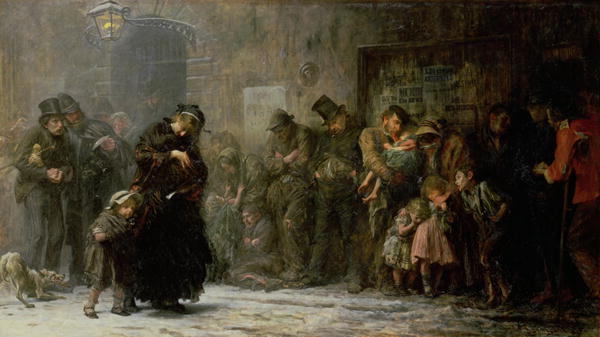For the life of me, I’ve never been able to understand the virulent and increasingly unhinged hostility to poor people getting health insurance. Currently some opponents of Obamacare are threatening to shut down the government and default on America’s debts if the law is not repealed. There are also those trying to convince young people to remain uninsured rather than sign up for the health care exchanges. (Here’s an article on how disastrous that could turn out for the young.)
Perhaps we should feel fortunate that few seem to be willing to take their case to its logical conclusion and say that emergency rooms also should turn down people who can’t afford to pay. Practically no one seems that hardhearted, and the law requiring hospitals to accept medical emergencies was signed by Ronald Reagan. Unfortunately, emergency rooms seem to have become the go-to answer for conservatives when presented with hard luck medical cases. To cite just one example, last September, to prove that he has a compassionate side, Mitt Romney told 60 Minutes, “Well, we do provide care for people who don’t have insurance. If someone has a heart attack, they don’t sit in their apartment and — and die. We pick them up in an ambulance, and take them to the hospital, and give them care.”
This reminds me of Scrooge’s dialogue with a gentleman looking for charitable contributions:
“At this festive season of the year, Mr. Scrooge,” said the gentleman, taking up a pen, “it is more than usually desirable that we should make some slight provision for the Poor and Destitute, who suffer greatly at the present time. Many thousands are in want of common necessaries; hundreds of thousands are in want of common comforts, sir.”
“Are there no prisons?” asked Scrooge.
“Plenty of prisons,” said the gentleman, laying down the pen again.
“And the Union workhouses?” demanded Scrooge. “Are they still in operation?”
“They are. Still,” returned the gentleman, “I wish I could say they were not.”
“The Treadmill and the Poor Law are in full vigour, then?” said Scrooge.
“Both very busy, sir.”
“Oh! I was afraid, from what you said at first, that something had occurred to stop them in their useful course,” said Scrooge. “I’m very glad to hear it.”
“Under the impression that they scarcely furnish Christian cheer of mind or body to the multitude,” returned the gentleman, “a few of us are endeavouring to raise a fund to buy the Poor some meat and drink and means of warmth. We choose this time, because it is a time, of all others, when Want is keenly felt, and Abundance rejoices. What shall I put you down for?”
“Nothing!” Scrooge replied.
“You wish to be anonymous?”
“I wish to be left alone,” said Scrooge. “Since you ask me what I wish, gentlemen, that is my answer. I don’t make merry myself at Christmas and I can’t afford to make idle people merry. I help to support the establishments I have mentioned — they cost enough; and those who are badly off must go there.”
There are a couple of things to be gleaned from this passage. First of all, apparently even Scrooge thinks that there should be some provisions for the poor, even if they are no more than union workhouses. We also see that people with money have been grumbling for a long time about being taxed to support those in need.
Scrooge could point out to the gentleman, however, that Christmas almsgiving is hardly going to make a dent in London’s poverty. Are the “Poor and Destitute” only to get some “slight provision” at the end of December? The gentleman in some ways defeats his own case when he says, “Many thousands are in want of common necessaries; hundreds of thousands are in want of common comforts, sir.”
Those in America who accept charity at the hands of emergency rooms are like those in Scrooge’s workhouses and prisons: they make up a small percentage of the millions that go without care. The prospect of helping those millions, not only with health insurance but also with shelter and food, was so daunting to Dickens that he could only imagine benevolent rich people helping a few (the Cratchit family, for instance). It took someone like Karl Marx, who five years after Christmas Carol wrote The Communist Manifesto, to imagine a radical redistribution of the wealth.
Few in America today are arguing for a working class revolution. Short of that, how about raising taxes on our Scrooges, thereby providing a single payer health plan for everyone?
Still too radical for you? Well, how about requiring everyone to get health insurance, helping subsidize those who can’t afford it. That way, all would be covered and Scrooge wouldn’t take such a big tax hit.
Oh wait, that’s what we have now. So why is Scrooge complaining?


